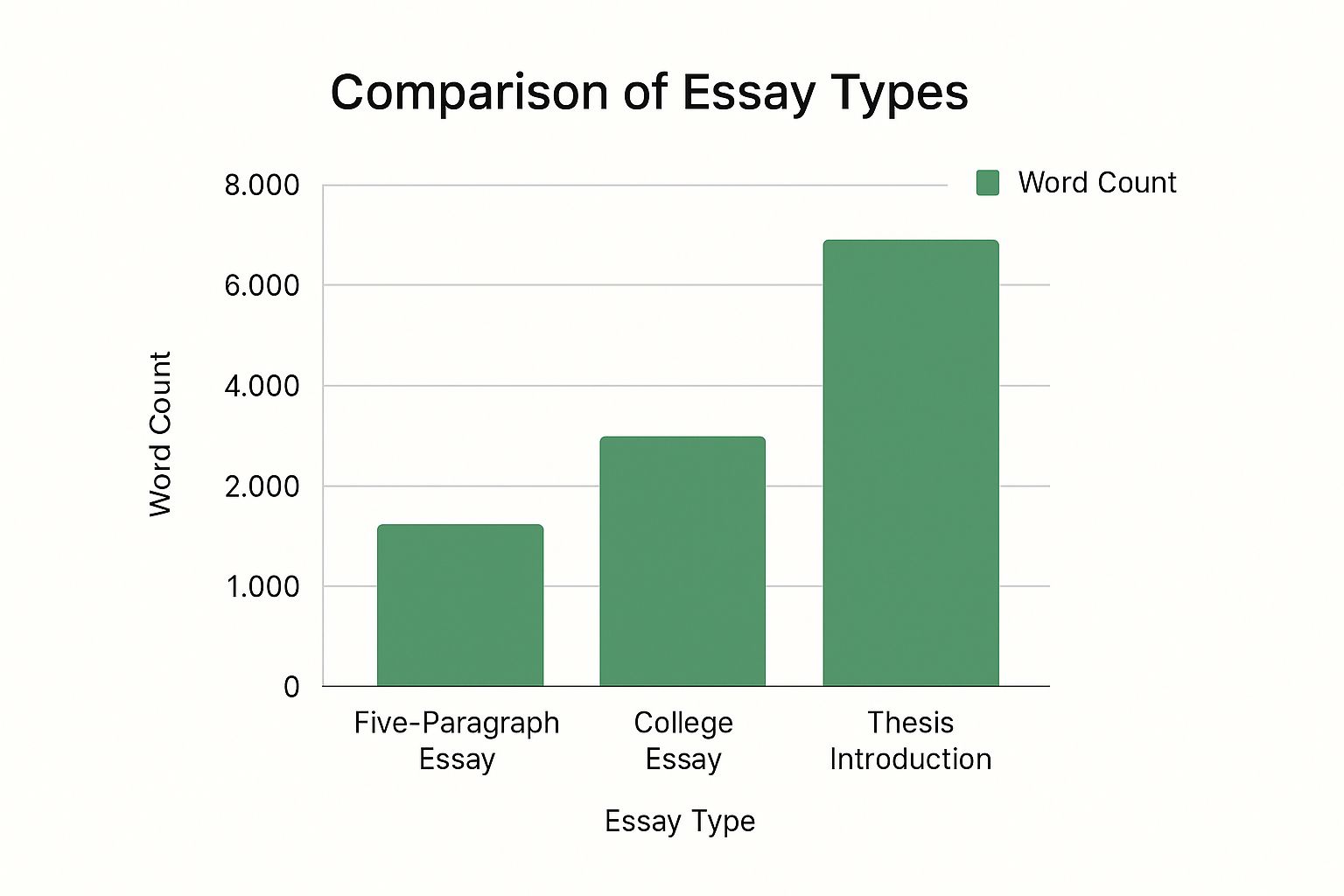
How Many Words Should an Essay Be? A Clear Guide
August 29, 2025
Ever wondered, "How many words should my essay be?" It’s a classic question, and the honest answer is: it depends.
While most standard essays you'll write in high school and early college fall somewhere between 300 and 1,000 words, that’s just a ballpark figure. The real target is set by your academic level and the specific type of essay you’ve been assigned.
Your Quick Guide to Essay Word Counts
Think of a word count not as a strict rule, but as a roadmap from your instructor. It’s their way of telling you how deep you need to go. A short word count calls for sharp, focused writing, while a longer one is an invitation to build a more complex argument with plenty of evidence.
This infographic shows just how much those expectations can change as you move up the academic ladder.

As you can see, the jump from a basic five-paragraph essay to a serious research paper is massive. It’s a whole different level of detail.
Standard Essay Word Counts by Academic Level
To give you a clearer picture, it helps to see the typical ranges side-by-side. The following table breaks down common essay lengths you'll encounter at different points in your education.
Standard Essay Word Counts by Academic Level
| Academic Level / Essay Type | Typical Word Count Range | Approximate Page Count (Double-Spaced) |
|---|---|---|
| High School Essay | 300–1,000 words | 1–4 pages |
| College Application Essay | 250–650 words | 1–2.5 pages |
| Undergraduate Paper | 1,500–5,000 words | 6–20 pages |
| Graduate-Level Research Paper | 2,500–6,000+ words | 10–25+ pages |
Remember, this is just a general guide. The single most important instruction is the one in your assignment brief. Your professor's guidelines always trump any average you find online. Sticking to them shows you're paying attention—a skill that’s just as important as the writing itself.
If you’re looking for a deeper dive into writing conventions and formatting, it can be helpful to consult a comprehensive writing style guide.
Why Word Counts Are More Than Just a Number

It’s tempting to look at an essay’s word count as just another arbitrary rule to follow. But it’s actually a fundamental part of the assignment. Think of it like the frame for a painting—it defines the size of your canvas and forces you to be intentional about what you include and what you leave out.
This framework is also a surprisingly useful tool for instructors. It helps them see if you can tackle a topic with the right amount of detail. A short essay challenges you to be sharp and concise, while a longer one tests your ability to sustain a complex argument with in-depth research.
The Balance Between Depth and Brevity
Nailing the word count is a balancing act, and getting it right shows off some serious academic skills. Each constraint is designed to test a different part of your thinking and writing discipline.
- Minimum Word Counts are there to push you past surface-level thoughts. They force you to dig deeper, find solid evidence, and fully flesh out your arguments instead of just scratching the surface.
- Maximum Word Counts are all about your editing and prioritizing skills. They make you trim the fat, sharpen your focus, and present your ideas with real clarity and punch.
When you successfully work within these limits, you’re proving you can be both thorough and efficient. That’s a skill that pays off long after you’ve left the classroom.
By mastering the word count, you aren’t just following rules; you're learning how to package your ideas effectively. This skill transforms a frustrating limit into a valuable tool for becoming a more persuasive and disciplined writer.
Ultimately, once you understand why the word count exists, you can stop seeing it as a hurdle and start using it as a guide. It's not about hitting some random number—it’s about proving you can shape your message to fit the scope, making every single word matter.
Matching Your Word Count to the Essay Type

The answer to "how long should an essay be?" really changes once you know its purpose. Let’s be real, not all assignments are the same. Their word counts are specifically designed for the task at hand, whether you’re telling a personal story, arguing a point, or digging into research.
Think of it like picking a vehicle for a trip. You wouldn’t take a massive tour bus to go across town, and you definitely wouldn't hop on a scooter for a cross-country road trip. In the same way, the type of essay you're writing dictates the length you need to get your point across effectively.
Common Essay Types and Their Lengths
Each format has a unique goal, and its word count gives you just the right amount of space to achieve it. A personal narrative, for instance, is all about focused, punchy storytelling, so a shorter length keeps the reader hooked without drowning them in unnecessary details.
Personal Narrative or College Application Essay (250–650 words): This one is all about concise, powerful storytelling. The tight limit forces you to be ruthless with your words, choosing only the moments that truly reveal your character. For something as important as admissions, checking out some essential college application essay tips can help you nail that story within the limit.
Persuasive or Argumentative Essay (1,000–2,000 words): Here, your job is to build a rock-solid case. The bigger word count gives you the room you need to introduce your thesis, back it up with multiple points and solid evidence, tackle counterarguments, and lead your reader to a logical conclusion.
A typical essay often falls between 150 and 650 words, usually with a 50-word buffer. This structure tends to give about 16% of the word count to the intro and conclusion, leaving the rest for the body paragraphs.
A 250-word discussion post demands a laser focus, while a 3,000-word research paper requires you to go deep. Once you understand the why behind each format, the word count stops feeling like a restriction and starts looking like a blueprint. It's a mental roadmap that helps you structure your work from the get-go.
Does a Longer Essay Actually Mean a Better Grade?

It’s a trap almost every student falls into at some point: the belief that more words will magically translate into more points. But the idea that a longer essay equals a better grade is a myth. In fact, it can actually hurt your score.
Professors care about clarity, precision, and the strength of your argument—not sheer volume. When you start padding your writing with fluff, repeating ideas, or chasing tangents just to hit a word count, it signals to your instructor that your argument is weak. They can spot it a mile away.
The goal isn’t to fill the page. It's to make every sentence count.
This concept is sometimes called argument density. Think of it like a concentrated formula: potent and effective, with no wasted space. Instead of adding filler, focus on strengthening your points with better evidence, clearer explanations, and more refined language.
Quality Over Quantity Always Wins
The best essays get straight to the point. They deliver a powerful argument and leave a lasting impression without meandering all over the place. This approach doesn't just show mastery of the topic; it respects your reader's time.
You might be surprised to learn that research often shows shorter, more focused essays actually get higher marks. One study found a significant negative correlation between length and the scores evaluators gave. It’s a clear sign that clarity trumps volume every time. You can read the full study about essay quality here.
Making this mental shift—from volume to value—is everything. If you're struggling to make your writing more concise and powerful, our guide on how to write better essays has practical tips that can help.
Ultimately, a well-crafted, efficient argument will always outscore a long, rambling one.
Practical Strategies to Hit Your Word Count Target
Whether you're staring at a blank page or a draft that’s way too long, hitting a specific word count is just part of the game. The good news is that both problems are fixable. It all comes down to either adding meaningful substance or cutting with precision.
If your essay feels too short, the goal is to add depth, not just filler. Forget about stretching sentences—focus on strengthening your arguments with more detail. This approach doesn't just bump up your word count; it makes your entire essay better.
How to Expand Your Essay
Think of your first draft as a skeleton. Now it's time to add some muscle. Every point you've made is an opportunity to go deeper. Try these methods to build it out:
- Use the "Point, Evidence, Explain" Model: For every claim you make, make sure you've backed it up with evidence (like a quote, statistic, or example). Then—and this is the key part—explain why that evidence proves your point. That final "explain" step is where most students find room to add significant, valuable content.
- Integrate Direct Quotes: Go back to your sources. Find short, punchy quotes that drive your claims home. Introduce the quote, drop it in, and then spend a sentence or two unpacking what it means in the context of your argument.
- Explore a Counterargument: Acknowledge an opposing viewpoint and then patiently explain why your position holds up better. This shows you've thought critically about the topic and can easily add a solid paragraph to your essay.
The secret to effective expansion is making sure every new sentence serves a purpose. Good writing isn't about saying more; it's about having more to say. Focusing on these strategies strengthens your essay while naturally answering the question of how many words should an essay be.
How to Shorten Your Essay
When your essay is running long, your new job is to be a ruthless editor. The goal is precision. Think of it like sharpening a blurry photo until it's crystal clear. Your task is to trim everything that doesn't add real value.
- Hunt Down Redundant Phrases: Be on the lookout for words that say the same thing twice, like "completely finished" or "basic fundamentals." Cutting these is an instant way to tighten up your writing.
- Switch to Active Voice: Sentences written in the passive voice are almost always wordier. Changing "The ball was hit by him" to "He hit the ball" is shorter, punchier, and more direct.
- Consolidate Weaker Sentences: Got a few short, choppy sentences back-to-back? Try combining them into a single, more powerful statement.
These editing principles are fundamental to strong communication in any field. For a deep dive into crafting structured written arguments, check out resources on how to write winning proposals. In the same vein, developing a clear and concise writing voice is crucial, a topic we cover extensively in our academic writing style guide.
Answering Your Top Questions About Essay Length
Even when you think you have a handle on word counts, a few questions always seem to come up. Let's clear up those nagging uncertainties with straight answers to the things students ask most. Think of this as your final check-in before you hit "submit."
What Happens If I Go Over or Under the Word Count?
Most instructors build in a little wiggle room. The unofficial “10% rule” is a common guideline, meaning a 1,000-word essay would be fine anywhere between 900 and 1,100 words.
But don’t treat that as a universal law. Some professors are incredibly strict, and they see your ability to write concisely as part of the grade itself. Going way over suggests you couldn’t organize your thoughts, while falling too far short implies you didn't dig deep enough.
Your best bet is always to aim as close to the target as possible. If the instructions are vague, just ask. It’s always safer than guessing.
Nailing the word count shows you respect the assignment and can follow directions—a skill that matters just as much as your writing.
Do Titles and Citations Count Towards the Word Count?
Almost never. When an assignment gives you a word count, it’s talking about the body of your essay.
That means your introduction, your body paragraphs, and your conclusion. Everything else is usually kept separate.
- Title Pages & Headers: Nope, these are just for formatting.
- Abstracts or Summaries: Usually excluded unless the prompt says otherwise.
- In-text Citations: Those little parenthetical citations like (Smith, 2021) are typically ignored.
- Footnotes or Endnotes: Also kept separate from the main text.
- Bibliography or Works Cited: This list of sources is never part of the core word count.
One heads-up: some online submission portals count every single word in the file. It's a good idea to check the word count of just your main text yourself before uploading to be sure you're on target. When in doubt, your assignment rubric is your best friend.
How Can I Accurately Check My Essay Word Count?
There’s no need to guess. Every modern word processor makes this dead simple, so you can keep an eye on your progress as you write and edit.
In Microsoft Word, you can usually see a live word count in the status bar at the bottom of the screen. Clicking it often brings up a more detailed breakdown.
If you’re a Google Docs user, just go to Tools > Word Count. The keyboard shortcut is even faster: Ctrl+Shift+C on Windows or Cmd+Shift+C on a Mac.
These built-in counters are all you need for accuracy. Use them often to stay on track. And for more strategies on polishing that final draft, check out our guide with essential essay editing tips to make your writing shine.


